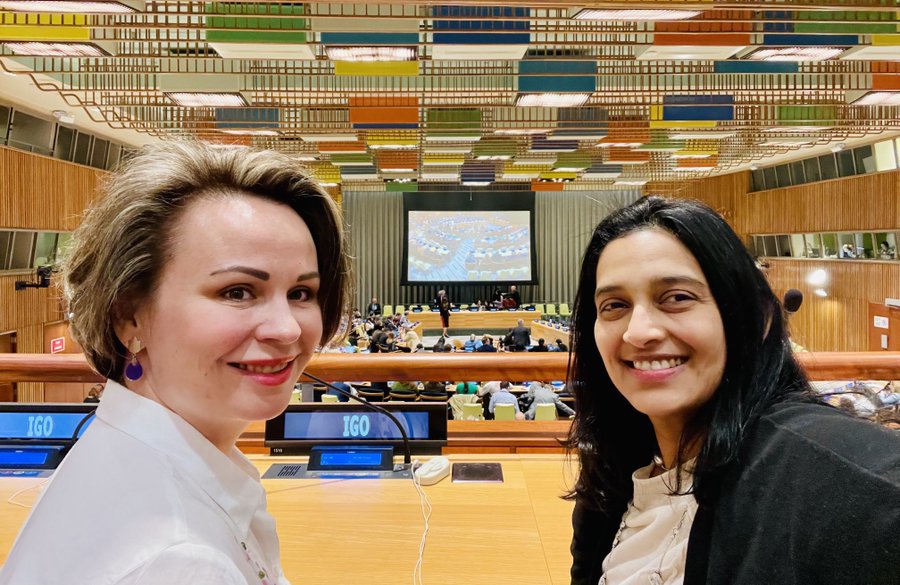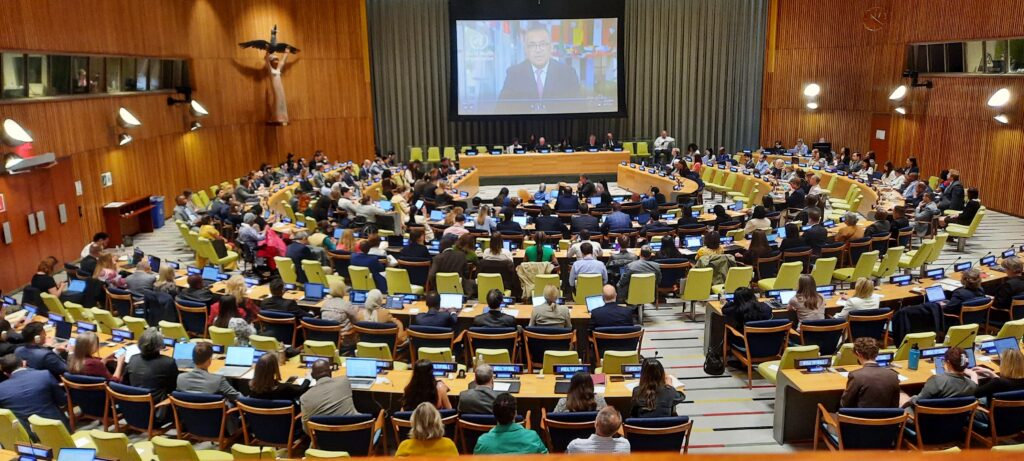Post
Published on August 3, 2023
Despite commendable advances in new Tuberculosis (TB) diagnostics and more safe and effective TB treatments, as depicted in the latest Global TB Report, 10.6 million people fell ill, and 1.6 million people died of TB in 2021. 2023 is a critical year with opportunities to raise visibility, political commitment, funding, and investments for the more effective and people-centered TB response.
On 8-9 May 2023, UN Multi-stakeholder Hearings on three components – TB, Universal Health Coverage (UHC) and Pandemic Prevention, Preparedness and Response (PPPR) – were held at the United Nations (UN) Headquarters in New York. They brought together representatives of the UN Member States, observers of the General Assembly, UN Missions, technical and donor agencies, civil society organizations and TB-affected community, academia, professional associations, and the private sector to voice up their expectations on the priorities of the Political Declaration ahead of High-Level Meeting on TB (UNHLM on TB) in September 2023 which will take place during the UN General Assembly.
Dr. Amrita Daftary, Dahdaleh Faculty Fellow and Associate Professor at the School of Global Health, York University, and a founding director of the Social Science & Health Innovation for TB (SSHIFTB), and Yuliya Chorna, doctoral student of the Program in Social Anthropology, York University and Dahdaleh Global Health Graduate Scholar, with the support from the Dahdaleh Institute, attended the Multi-stakeholder Hearings. Their participation in the Multi-stakeholder Hearings and side events helped to expand research and networking opportunities with the global academia, affected community, and other stakeholders in TB and analyzing existing discourses central for TB response.


Dr. Daftary’s intervention during the TB Multi-stakeholder Hearings gave a strong impulse to further negotiations of the text of the Political Declaration on the value of the social science TB research: “The TB research & development agenda has to include social science research adjacent to biomedical research. Social science TB research is the approach to unveil and address the social determinants of TB. Often qualitative, it is by nature inclusive, participatory, equity-oriented, anti-colonial and community engaged. It can serve as a bridge to mobilize the acceptability and utilization of TB innovations and technologies.”
Social scientists have indeed made a tremendous contribution to the growing recognition of TB as a disease linked to social determinants and inequities. Despite this recognition and some momentum towards multisectoral actions in the TB response, TB policy and practice still retains a predominantly biomedical focus.
Hopefully, the 2023 UN HLM on TB (offers a window of opportunity to transform normative discourses in TB and stimulate steady changes in subsequent responses, including sufficient funding allocations to support social science insights on the drivers of TB, and to inform the development and evaluation of emerging tools and approaches. The programme is available at the UN General Assembly Resolution: A/RES/77/274. Specially accredited stakeholders may register here and ECOSOC-accredited organizations may register here by August 11, 2023, 12:00 EDT.
A zero draft of the Political Declaration of the UNHLM on TB has been released after these UN Multi-stakeholder Hearings, and there have been further consultations facilitated by various coordination platforms with engagement of stakeholders, including academia to feed into the document - ensuring it prioritizes a more equitable and people-centered TB response.
Themes | Global Health & Humanitarianism |
Status | Active |
Related Work | |
Updates |
N/A
|
People |
Amrita Daftary, Faculty Fellow, Faculty of Health - Active
Yuliya Chorna, Dahdaleh Global Health Graduate Scholar, Faculty of Liberal Arts & Professional Studies - Active |
You may also be interested in...
Recap — The Effects of COVID -19 Pandemic on Migration Plans and Experiences of Punjabi International Students in the Greater Toronto Area
As part of the 2023-2024 Dahdaleh Seminar Series, on September 13, 2023, Professor Tania Das Gupta (Faculty of Liberal Arts & Professional Studies, York University) presented her documentary film titled, Mobile Dreams: Punjabi International Students ...Read more about this Post
Recap – Evaluating Health and Environmental Impact of Eco-Friendly Fuel Made From Water Hyacinth
On February 21, 2024, Dr. Reginald Quansah, senior lecturer at the University of Ghana and an environmental epidemiologist, presented his research on using invasive aquatic weeds, particularly water hyacinth, to produce biomass briquettes. This innovative ...Read more about this Post
Hot off the Press – New Opinion Article Publication: DATA: A Key for Unlocking Quality in WASH Programming
A new article has been authored by experts from the Dahdaleh Institute for Global Health Research and collaborators from mWater, the Mortenson Center, Aquaya Institute, Global Water Challenge, and ETH Zurich. The paper, titled Challenges ...Read more about this Post
